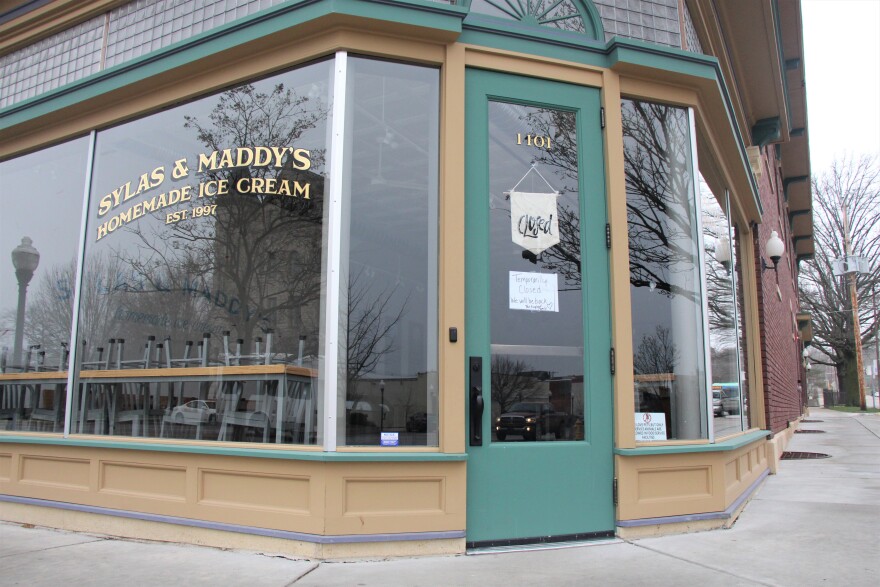Update: Sedgwick County has finalized its stay-home order.
LAWRENCE, Kansas — Six Kansas counties are ordering residents to stay home unless they’re buying groceries, getting health care or carrying out other essential tasks.
The orders apply in Wyandotte, Johnson, Leavenworth, Douglas, Miami and Doniphan counties. Gov. Laura Kelly said she’s not ready to issue her own statewide shelter-in-place order, but that could change.

After all, the state’s latest projections suggest the number of COVID-19 cases could grow five-fold in the next week.
“The crisis continues to evolve by the hour,” she told reporters on Monday, “a statewide stay-at-home order may indeed become unavoidable.”
For now, Kelly said, she’s limiting all public gatherings statewide to 10 people — a drop from the 50-person cap she had already set.
“We are starting to see serious cases in every age group, not just among our seniors,” she said. “If we all do our part now, we can get this under control much more quickly, which will lead to more lives saved.”
Kansas had about 80 known cases of COVID-19 when she spoke, but health officials expected that number to hit between 300 and 400 over the next seven to 10 days.
Only a small fraction of the population has been tested. So the true number of Kansans with the virus will be higher.
View a map of confirmed COVID-19 cases in Kansas
Wyandotte, Johnson, Leavenworth and Douglas counties (and nearby Missouri counties Jackson, Clay and Platte) announced their stay-at-home orders over the weekend. Those start Tuesday and run to April 24.
Miami and Doniphan counties followed suit. Miami County’s order starts Wednesday and lasts until April 23. Doniphan’s starts Thursday and runs through April 6.
Sedgwick County commissioners have approved a similar order that isn’t finalized yet.

Health officials have made clear they saw little choice, given that seemingly healthy people are carrying the virus.
“There is emerging evidence” from Johnson and other counties “of transmission by pre-symptomatic and asymptomatic people,” Douglas County’s order says.
Even with schools and dine-in restaurants already closed, Douglas officials worry it’s not enough to prevent a wave of seriously ill people from overwhelming the health system. In that scenario, Kansas hospitals would run out of ventilators and beds for patients, and protective gear for workers.
The county’s stay-home order requires many businesses to close, though gas stations, banks and certain others will stay open.
Taking your pet to the vet is okay. Going to a friend’s house for dinner isn’t.
Going for a jog is okay, but if you prefer a local gym, you’re out of luck.
Douglas County said the strategy “is even more important in the context of limited testing capacity, as is the case in the Kansas City area.”
Johnson County was the first Kansas county with confirmed community spread of the virus that causes COVID-19. Health officials there have scaled back testing.
Kansas City area residents and public officials are frustrated with the lack of easy testing access, though at least one local clinic has launched drive-through testing for patients with doctor referrals or who have first contacted the clinic’s hotline.
Last Friday, the Kansas health secretary said his agency would likely run out of test kits within a day. Over the weekend, 500 more kits arrived, which officials hoped would be enough for this week.
However, the state health department will focus on testing health care workers and first responders who have been exposed to COVID-19 or show symptoms.
“Spain has about 10% of its cases in health care workers,” he said. “We cannot allow that to happen.”
Early testing is part of the state’s strategy to avoid the same trend.
The state’s other priorities include testing patients in situations where a cluster of people all came down with COVID-19 symptoms, or involving group settings such as nursing homes.
People who don’t meet the state health department’s criteria can still seek testing through commercial labs by seeing their primary care provider.
Celia Llopis-Jepsen reports on consumer health and education for the Kansas News Service. You can follow her on Twitter @celia_LJ or email her at celia (at) kcur (dot) org. The Kansas News Service is a collaboration of KCUR, Kansas Public Radio, KMUW and High Plains Public Radio focused on health, the social determinants of health and their connection to public policy.
Kansas News Service stories and photos may be republished by news media at no cost with proper attribution and a link to ksnewsservice.org.




